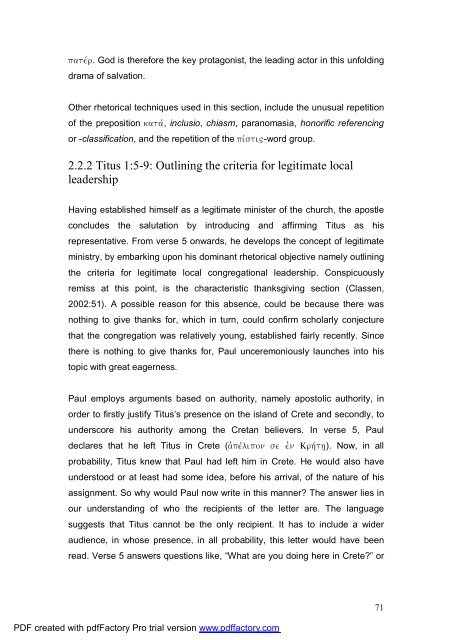A Text centred rhetorical analysis of Paul's Letter to Titus
A Text centred rhetorical analysis of Paul's Letter to Titus
A Text centred rhetorical analysis of Paul's Letter to Titus
You also want an ePaper? Increase the reach of your titles
YUMPU automatically turns print PDFs into web optimized ePapers that Google loves.
patevr. God is therefore the key protagonist, the leading ac<strong>to</strong>r in this unfolding<br />
drama <strong>of</strong> salvation.<br />
Other <strong>rhe<strong>to</strong>rical</strong> techniques used in this section, include the unusual repetition<br />
<strong>of</strong> the preposition katav, inclusio, chiasm, paranomasia, honorific referencing<br />
or -classification, and the repetition <strong>of</strong> the pivsti~-word group.<br />
2.2.2 <strong>Titus</strong> 1:5-9: Outlining the criteria for legitimate local<br />
leadership<br />
Having established himself as a legitimate minister <strong>of</strong> the church, the apostle<br />
concludes the salutation by introducing and affirming <strong>Titus</strong> as his<br />
representative. From verse 5 onwards, he develops the concept <strong>of</strong> legitimate<br />
ministry, by embarking upon his dominant <strong>rhe<strong>to</strong>rical</strong> objective namely outlining<br />
the criteria for legitimate local congregational leadership. Conspicuously<br />
remiss at this point, is the characteristic thanksgiving section (Classen,<br />
2002:51). A possible reason for this absence, could be because there was<br />
nothing <strong>to</strong> give thanks for, which in turn, could confirm scholarly conjecture<br />
that the congregation was relatively young, established fairly recently. Since<br />
there is nothing <strong>to</strong> give thanks for, Paul unceremoniously launches in<strong>to</strong> his<br />
<strong>to</strong>pic with great eagerness.<br />
Paul employs arguments based on authority, namely apos<strong>to</strong>lic authority, in<br />
order <strong>to</strong> firstly justify <strong>Titus</strong>’s presence on the island <strong>of</strong> Crete and secondly, <strong>to</strong><br />
underscore his authority among the Cretan believers. In verse 5, Paul<br />
declares that he left <strong>Titus</strong> in Crete (ajpevlipon se ejn Krhvth/). Now, in all<br />
probability, <strong>Titus</strong> knew that Paul had left him in Crete. He would also have<br />
unders<strong>to</strong>od or at least had some idea, before his arrival, <strong>of</strong> the nature <strong>of</strong> his<br />
assignment. So why would Paul now write in this manner? The answer lies in<br />
our understanding <strong>of</strong> who the recipients <strong>of</strong> the letter are. The language<br />
suggests that <strong>Titus</strong> cannot be the only recipient. It has <strong>to</strong> include a wider<br />
audience, in whose presence, in all probability, this letter would have been<br />
read. Verse 5 answers questions like, “What are you doing here in Crete?” or<br />
PDF created with pdfFac<strong>to</strong>ry Pro trial version www.pdffac<strong>to</strong>ry.com<br />
71

















